Torcida Split - the oldest European supporter group 1950 - 1970 Word TORCIDA comes from Spanish word Torsida ( in connection with Latin word Torquere- to turn around, to turn over ) which means - frantic support with all possible acoustic means to cause the victory of a sports team. Story about TORCIDA begins somewhere in the summer of 1950. World Cup takes place at that time, dominated by Brazilians who attracted attention of all football fanatics from all over the world with their southern temperament and conception of The Game. Cariocas were at that time gladly received guest, filling up stadiums in every corner of the earth. They attracted attention not only with their skills, but also with their temperament army of supporters, their TORCIDA. At the same time, on the other side of the globe, in Split, a little pitoresque town on the Adriatic coast, students were packing their “ stuff ”, and books too, and were buying tickets for the train that will knead them to the place where they were studying, Zagreb. In dark and moist student abodes of Zagreb's outskirts, frequently with more than twenty pairs of glossy eyes prick-eared to one radio, students were listening to the conveyance of the Cup games, reading late game reports in papers, and were being mesmerized by Brazilian TORCIDA. In the heads of Valenta, Zuvela, Doric, Ivanisevic and other future engineers, lawyers, and doctors, far famed “Dalmatian dispet” (insolence, quarrel, defiance, refractoriness, spite, and much much more than that) was born again. Question they asked was: “ Why couldn't we do the same thing for our Hajduk ( football club )? ” And the idea took up. Everything was arranged speedily. Split was called up. Hajduk's TORCIDA will have its feverish baptism on the 28th of October, 1950 AD. in a game against abominable and detestable opponent, Red Star from Belgrade, the world capitol of mitomany. Two overcrowded trains, full of students from Zagreb-members of TORCIDA, were rattling and clocking towards Split night before the big game. The heart of every Hajduk's fan was beating fast that night. Tomorrow is a great day and Split was ready! One group of supporters was beating up pots throughout the night in front of the Park Hotel where Star's players had been located. that event will later turn out to be a custom for big games, and an important piece of Split's football folklore. And the big moment finally came. The brimful “Stari Plac” ( Old Field in free translation ) took twenty thousand people. It was so crowded that even a needle couldn't get in. Hundreds of supporters stayed in front of the stadium, and others were chewing their nails by radio receivers. On the crutch covered turf, craftsmen were throwing slaked lime, correcting field lines just moments before the game. Teams run out. Referee whistles a start. But, that wasn't a game, it was a war ladies and germs. Game starts. TORCIDA raises a hell. Red Star needs only a tie to win a championship. Still, in 31st minute, star's captain Rajko Mitic scores a goal. Half-time ends 0:1 for Red Star. Second half takes off. Hajduk attacks with storming force. Unbearable fever shakes the terraces. Nobody dears to think that the game will end like a final in Rio de Janeiro. Brazil misfortunately lost a final game of the World Cup against Uruguay, on its Maracana, in front of 200.000 supporters. After the game was over, eight supporters were lying dead on Maracana's terraces. Three of them were old folks that had heart attacks, and five of them were young ones who just couldn't get over the loss, so guns that were supposed to be used for celebration were used as an ultimate act of loyalty. They shot themselves. Luckily, Hajduk's TORCIDA was more fortunate than their Brazilian brothers. In 74th minute, the one and the only, The Legend, Bernard-Bajdo Vukas performed a show. He started on a left wing, breaking reds with his miraculous dribbles, one by one, all the way, until he didn't pass the last of them, Stankovic. Arriving at the dead corner, everybody thought that he'll make a throw in, even Star's goalkeeper Mrkusic. But, he it wasn't. It was a GOOOOOOAL!!!!!!! TORCIDA shifts into sixth gear. Hell goes from terraces onto the turf. Whites (Hajduk) captain Frane Matosic , anther of “ the eternal legends " ( best scorer in Hajduk's history ), after being ugly tackled by Stankovic, knocks him off the hook. Stankovic falls down like an apple, but the referee, scared of the crowd, doesn't whistle anything. Hajduk continues with a pressure. All the players except goalkeeper Beara are on Star's half of the turf. Finally, in 87th minute, Bozo Broketa rushes upon one of the bounced balls, and from the 90 feet distance fires a cannon. GOOOOOOOOOOALLLL!!!! TORCIDA invades the turf. Game is interrupted. After a couple of minutes game continues. TORCIDA celebrates, stadium is erupting in enthusiasm, pieces of clothes fly all over, people throw themselves into each others arms, tears of joy run down in streams, and then in moment, the whole stadium is joined in singing “ Marjane, Marjane ”. The game is over. Celebration spreads throughout the town and whole Dalmatia. Hundreds of supporters stayed on the stadium long in the night, touching and kissing the post that was scratched by Broketa's bomb.
Ten years later, championship title was back in Split. That was the first time in history that a club won without losing a game, a record not surpassed to these days. Majestic fiesta was launched. Whole town was gathered together, all in all 70 000 souls. It happened in the year of Torcida's tenth anniversary. That is how “ The Master from the Sea ” celebrates its great victory. In Hajduk's annals we can find info on some of the big torch-light processions that happened long time ago, in the time when such things were rarity in Italy. One of those processions took place in 1964. in Rijeka, during the match between Hajduk and OFK Belgrade. Game was played there because “ Old Field ” was under suspension, caused by the pitch-invasion in the game against Sarajevo. Torcida's members made a circle around the stadium, and then lighted dozens of torches, celebrating 4:1 victory. In the cup final of 1967, played in Split against Sarajevo, another memorable procession took place, being a part of glorious atmosphere. Here's what Hajduk's annals say about it: “ Flags twist, Banners are put together, Ship sirens greased. Seamen ship boxes and boxes of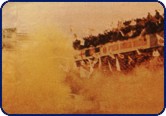 firecrackers, frogs, and rockets. Brass bands come from surrounding towns. Zagora ( inland part of Dalmatia ) climbs down with its lively folklore costumes. Boduls ( people from islands ) sail towards Split docks in convoys of decorated boats. Half of Dalmatia congregated in Split. People carry banners and flags. Rockets are launched. Mortars rattle. Ship sirens whistle.Church bells ring. The entrance is closed an hour before the game start. 30 000 thousand people is already inside, more than stadium can take. At least as many people stay outside. " firecrackers, frogs, and rockets. Brass bands come from surrounding towns. Zagora ( inland part of Dalmatia ) climbs down with its lively folklore costumes. Boduls ( people from islands ) sail towards Split docks in convoys of decorated boats. Half of Dalmatia congregated in Split. People carry banners and flags. Rockets are launched. Mortars rattle. Ship sirens whistle.Church bells ring. The entrance is closed an hour before the game start. 30 000 thousand people is already inside, more than stadium can take. At least as many people stay outside. " 1970 - 1980 In the year of Croatian Spring 1971, Hajduk is a champion again, after sixteen years of drought. All the things that happened before and after the game against Olimpia from Ljubljana, on The Old Field and in the town streets, wasn't just a celebration. It was a rising of the tribe, a national feast, a big holiday boiled with joy. Everybody was part of it, from infants to old folks, from garbage men to university professors. There were no wise asses, and superiors fearing that being part of this lucidity will lessen their reputation and dignity. Doctors are not ashamed of howling the sirens. Couples that already have grandchildren wave white flags, professors are screaming in front of students. Miracles happened that day my friend. Disabled people are healed and transformed into athletes. They are swinging spokes from their wheelchairs and chasing with limousines. Altogether, 35.000 attended, and as least as many stayed outside. In this variegated crowd there were those that couldn't make a difference between a corner and a throw in, but they were grinding their glottises. Hajduk's triumph represents the synthesis of all the victories and accomplishments that put together make a hymn to this town and its people.
In late 80s, crucial moments came for Croatia. Serbian Aggression can be smelled in the air. In the fall of 1990. Torcida tells everybody what they think about Yugoslavia, in the game against another
|
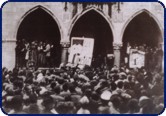
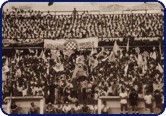
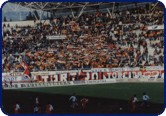 After the new stadium for Hajduk was built on Poljud in 1979, brave young fellas decided to, no matter what happened, come out with the name again. Authorities weren't amused with that idea. But it held on thanks to the faith and endurance of the supporters. Young generations accepted the name instantly. In the 80s, Torcida is in club competition and subculture that follows it both a pioneer and a veteran in many things. They are recognized by their orange “ spitfire ” jackets,
After the new stadium for Hajduk was built on Poljud in 1979, brave young fellas decided to, no matter what happened, come out with the name again. Authorities weren't amused with that idea. But it held on thanks to the faith and endurance of the supporters. Young generations accepted the name instantly. In the 80s, Torcida is in club competition and subculture that follows it both a pioneer and a veteran in many things. They are recognized by their orange “ spitfire ” jackets,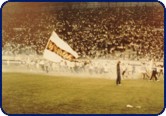 clone mutant from Belgrade, Partizan. Torcida interrupts the game first with smoke bombs, then with huge fire works, and finally with pitch invasion, when the loathsome yugo flag was burned down. Next spring dark anticipations came out to be true. barbarians from the east attacked. First victim laid dead. Torcida, consistent with its heart, together with other Croatian supporters goes to the war to fight the evil product of mitomany.
clone mutant from Belgrade, Partizan. Torcida interrupts the game first with smoke bombs, then with huge fire works, and finally with pitch invasion, when the loathsome yugo flag was burned down. Next spring dark anticipations came out to be true. barbarians from the east attacked. First victim laid dead. Torcida, consistent with its heart, together with other Croatian supporters goes to the war to fight the evil product of mitomany.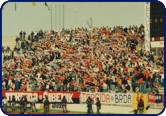 Few years later, the war is over. Beast is in the cage. In the memory of all Torcida's members that gave their young lives for Croatian freedom, monument was raised up above the “ M ” entrance to the north terraces of the stadium in Poljud. That is the cult place where, before the war, some other battles were fought, dreamed dreams, shared the joy and sadness. And now the dreams came true. The monument says: " Huge pride raises up from here With faith and strength shines up the home On the bloody wall Torcida comes And Croat will be on the rock of its own. "
Few years later, the war is over. Beast is in the cage. In the memory of all Torcida's members that gave their young lives for Croatian freedom, monument was raised up above the “ M ” entrance to the north terraces of the stadium in Poljud. That is the cult place where, before the war, some other battles were fought, dreamed dreams, shared the joy and sadness. And now the dreams came true. The monument says: " Huge pride raises up from here With faith and strength shines up the home On the bloody wall Torcida comes And Croat will be on the rock of its own. " 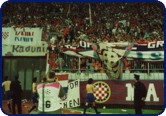 takes another crown, and next year first double ( cup and championship ) crown in independent Croatia. In the same year, long waited Europe is lived out through Warshava, Bucharest, Bruxelles, Lisbon, and for the second time in two years Amsterdam. Throughout that time Torcida strengthens like an organization and in its reputation. Finally, they got couple of square feet for their home. and the respect from yesterdays critiques. But those details are well known to the todays generation of supporters. Torcida momentarily goes through, we believe short and transitory, a crisis. Repeating them would be useless effort to put an emphasis on just one part of the story that, hopefully, will never end ...
takes another crown, and next year first double ( cup and championship ) crown in independent Croatia. In the same year, long waited Europe is lived out through Warshava, Bucharest, Bruxelles, Lisbon, and for the second time in two years Amsterdam. Throughout that time Torcida strengthens like an organization and in its reputation. Finally, they got couple of square feet for their home. and the respect from yesterdays critiques. But those details are well known to the todays generation of supporters. Torcida momentarily goes through, we believe short and transitory, a crisis. Repeating them would be useless effort to put an emphasis on just one part of the story that, hopefully, will never end ...